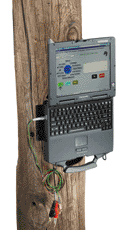SBC Makes 'Tough' Call For Mobile Field-Force Notebook Deployment
That's why when SBC Communications elected to deploy notebooks to its entire field force as part of the company's Technician Of The Future program, it chose ruggedized models from Panasonic.
SBC's program required that laptops be given to about 25,000 employees who install and repair telephone lines for customers across 13 states. The notebooks would simplify route planning and line testing, provide detailed service-call information and give employees access to online technical manuals.

\
The Panasonic Toughbook's hard drive is shock-mounted so it won't get damaged.
The San Antonio telecommunications company needed the notebooks to offer certain features. For one, a CD-ROM bay would accommodate the line-testing device used by SBC employees. For another, the systems had to be durable enough to withstand a variety of weather conditions.
Ultimately, SBC chose the Toughbook 27 from Secaucus, N.J.-based Panasonic, not just because it could take some knocks but also because of its flexibility.
Panasonic, along with New York-based Accenture and International Computer Marketing (ICM), an integrator based in Atlanta, worked with SBC to provide the custom testing device, wireless capabilities and special mounting hardware for the laptops.
"It was essential for us to find a company that was willing to work with us and design the [notebooks specifically to meet the current and future needs of SBC technicians in a user-friendly manner," said Carol Murphy, general manager of SBC's Technician Of The Future program.
Panasonic's Pentium III-based Toughbook comes in a magnesium-alloy case with a dust- and moisture-resistant shell. The removable hard drive is shock-mounted so that it won't get damaged when jostled en route to an installation or repair site. The notebook also has an antireflexive 12.1-inch touch screen, GPS capabilities and a built-in chip to enable communications via SBC's Cingular wireless service.
Panasonic's rugged notebooks can support virtually all wireless cellular services, as well as Wi-Fi networks, said Kevin Martin, vice president of business development at Panasonic.
The notebook's price ranges from $3,500 to $5,000, and Panasonic sells all of its models exclusively through solution providers, he said.
Gary Campbell, COO of ICM, said finding the right rugged computing device was crucial to successfully completing the project.
"These notebooks need to work in the summer, when it's 100 degrees outside, and in the winter, when it's -32," he said.
The fact is, rugged computers are required for virtually all field-force applications, said Campbell. "You want to make sure as best you can to apply the proper tool to the environment each person is working in," he said.
Although mobile solutions for field-force automation are nothing new, the vertical has plenty of room to grow, said Eugene Signorini, analyst of mobile and wireless technology at The Yankee Group.
In its most recent report on field-force mobile solutions, the market-research firm projected that revenue for hardware, software and wireless services combined will jump to $2 billion in 2006 from $700 million this year.
For solution providers, the best opportunities lie in giving field-force workers access to legacy data systems, upgrading outdated mobile solutions and adding wireless components to mobile applications, said Signorini.
And there are a number of other lucrative value-adds that integrators can capitalize on when deploying mobile solutions, said Campbell.
In the case of SBC, for example, ICM provided training and asset-management. Another value-add is device management, whereby solution providers can offer ongoing services and ensure that no software conflicts arise when applications are added.